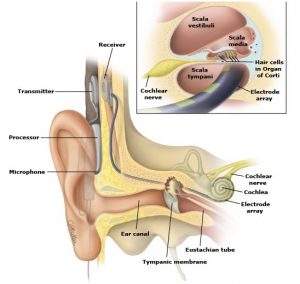COCHLEAR IMPLANT
What is a cochlear implant?
Cochlear implants are surgically-implanted devices that electrically stimulate the cochlear nerve (the nerve dedicated to hearing) to provide hearing.
It basically bypasses the damaged cochlear cells and stimulates the hearing nerve.
The device consists of a battery-powered external processor (that looks like a hearing aid), a receiver coil implanted below the scalp, and an electrode inserted directly into the cochlea (the inner part of the ear) through a surgical opening.

Who can benefit from a cochlear implant?
Cochlear implantation can be performed on babies as young as 12 months as well as patients over 70 years. Patients do not need to completely deaf to benefit from cochlear implants. Indeed, most patients have some hearing capacity.
There are 3 main criteria in deciding the appropriate candidature of a patient for a cochlear implant:
- Severe hearing loss in one or both ears
- Little or no benefit from conventional hearing aids
- Highly motivated patients or parents with appropriate expectations.
What are the steps in cochlear implantation?
There are four basic steps to cochlear implantation.
It all begins with evaluation of the patients’ hearing to assess the severity and type of hearing loss. This is followed by imaging to determine if it is surgically feasible to implant a cochlear.
The next step is the surgical implantation of the cochlear. The cochlea is accessed through an incision behind the ear. At the end of surgery, the implant is tested using specialized software to assess if it is working
Four weeks after surgery, the cochlear is switched on.
The last step is mapping and rehabilitation done by the audiologists. Mapping optimises the programming for the patients’ needs. Without mapping, the cochlear is useless. Willingness to comply with the intense and prolonged rehabilitation is crucial to better hearing outcomes. This is why motivation is an important criterion in selecting patients.
How do I know if my child has a hearing loss?
If you think that your child might have hearing loss, ask the child’s doctor for a hearing screening as soon as possible. Don’t wait!
Even if a child has passed a hearing screening before, it is important to look out for the following signs.
Signs in Babies
- Does not startle at loud noises.
- Does not turn to the source of a sound after 6 months of age.
- Does not say single words, such as “dada” or “mama” by 1 year of age.
- Turns head when he or she sees you but not if you only call out his or her name. This sometimes is mistaken for not paying attention or just ignoring, but could be the result of a partial or complete hearing loss.
- Seems to hear some sounds but not others.
Signs in Children
- Speech is delayed.
- Speech is not clear.
- Does not follow directions. This sometimes is mistaken for not paying attention or just ignoring, but could be the result of a partial or complete hearing loss.
- Often says, “Huh?”
- Turns the TV volume up too high.
What are the symptoms of hearing loss in an adult?
Most of the time hearing problems begin gradually without discomfort or pain. What’s more, family members often learn to adapt to someone’s hearing loss without even realizing they are doing it. Symptoms include:
- Trouble following conversations with more than two people
- Difficulty hearing what is said unless facing the speaker
- Struggling to hear in crowded places like restaurants, malls and meeting rooms
- Hard time hearing women or children
- Preferring the TV or radio volume louder than others
- Experiencing ringing or buzzing in my ears (tinnitus)
- Hearing like other people are mumbling or slurring their words
What is the expected outcome?
Improvement in hearing and speech depend on the cause of the hearing loss, age of the patient, length of hearing disability and rehabilitation.
With regards to adults, the best candidates for cochlear implants are postlingual (had speech and language skills before losing their hearing), and most adult candidates for a cochlear implant fall into this category.
In children, those whose deafness occurs after age two years, who are deaf for short periods of time, who use oral communication, and/or who are implanted at an earlier age have the better language outcomes.
Are there any restrictions to activities?
Patients with cochlear implants are able to participate in most sports. Patients must remove the external speech processor for activities including water sports and must be cautious of their lack of hearing during these activities.

